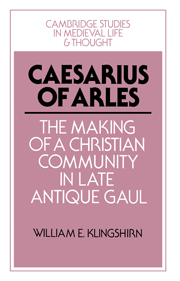Book contents
- Frontmatter
- Contents
- List of maps
- Acknowledgments
- List of abbreviations
- Concordance of Caesarius's Letters
- Map 1 The diocese of Aries and environs (c. 500)
- Map 2 The city and suburbs of Aries (c. 530)
- Introduction
- 1 In search of the vita perfecta
- 2 Late Roman Aries
- 3 The making of a reformer
- 4 Visigothic Arles and its bishop
- 5 The Ostrogothic peace
- 6 Christian rhetoric and ritual action
- 7 Christianity as a community religion
- 8 The limits of christianization
- 9 The coming of the Franks
- 10 The legacy of Caesarius
- Select bibliography
- Index
- Cambridge Studies in Medieval Life and Thought Fourth series
10 - The legacy of Caesarius
Published online by Cambridge University Press: 02 December 2009
- Frontmatter
- Contents
- List of maps
- Acknowledgments
- List of abbreviations
- Concordance of Caesarius's Letters
- Map 1 The diocese of Aries and environs (c. 500)
- Map 2 The city and suburbs of Aries (c. 530)
- Introduction
- 1 In search of the vita perfecta
- 2 Late Roman Aries
- 3 The making of a reformer
- 4 Visigothic Arles and its bishop
- 5 The Ostrogothic peace
- 6 Christian rhetoric and ritual action
- 7 Christianity as a community religion
- 8 The limits of christianization
- 9 The coming of the Franks
- 10 The legacy of Caesarius
- Select bibliography
- Index
- Cambridge Studies in Medieval Life and Thought Fourth series
Summary
In a famous letter of 742 to Pope Zacharias, Boniface called attention to what he perceived as an alarming disarray in the Frankish church:
The Franks, according to their elders, have not held a council for more than eighty years, nor have they had an archbishop or established or restored anywhere the canon law of the Church. For the most part the episcopal sees in cities are in the hands of greedy laymen or are exploited by adulterous and vicious clergymen and publicans for secular uses … And certain bishops are to be found among them who, although they deny that they are fornicators or adulterers, are drunkards and shiftless men, given to hunting and to fighting in the army like soldiers and by their own hands shedding blood, whether of heathens or Christians.
Boniface informed the pope that it was for these reasons that Carloman had decided to convene a council to re-establish ecclesiastical discipline. At the same time, to strengthen his own efforts to convert the Alamanni, Bavarians, and Franks, Boniface called upon Zacharias to prohibit “pagan” practices that had long been tolerated in Rome, including the observance of the Kalends of January and the wearing of amulets. He confirmed his appeal by a passage he mistakenly thought Augustine had written; it was in fact written by Caesarius: “He who believes in these evils, that is, fortunetellers, diviners, and soothsayers, or phylacteries and other auguries of any kind, even if he fasts, prays, constantly attends church, gives abundant alms, and mortifies his body with every affliction, will gain nothing unless he abandons these sacrileges” (serm. 54.5).
- Type
- Chapter
- Information
- Caesarius of ArlesThe Making of a Christian Community in Late Antique Gaul, pp. 273 - 286Publisher: Cambridge University PressPrint publication year: 1993



